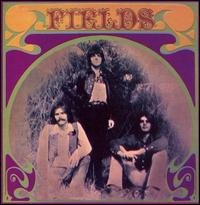While Fields are officially only three people, throughout their lone LP they get help in all the right places. That's not to say they can't hold their own; both guitarist Richard Fortunato and bassist Patrick Burke bend their timbre to sound like everything from harmonicas to saxophones. But they also know that a grimy sax section can sound pretty badass, and hell, throw in some viola for a little mysteriousness. Furthermore, they managed to snag Motown's Brenda Holloway and the Raylettes -- whom Ray Charles apparently wasn't using at the time -- to lend backing vocals to four of the tracks.
Fields has its roots in the California garage and psych scene, but they find the most success here with strutting swamp-funk, such as the none-too-subtle romper "Jump On You." "Sun Would Set," on the other hand, is the kind of utopian haze that has fared less well, and the snowballing tom-tom break at the end of "Bide My Time" disappointingly leads nowhere. Why would you build it up like that just to fade out?
For a decade that was so reluctant to accept a single that was longer than 3 minutes, the '60s seemed to quickly catch on to the long-ass closing track, with 10-20 minute jams cropping up all over the place. "Love Is The Word," clocking in at close to 19 minutes, is significantly darker than its title would suggest. Neither one long boogie-jam nor a cathartic exorcism, the track churns through the spectrum of murky fuzz, from sly seduction to cautious urging to a driving trance, breaking up only for a silly little section about the animals in the zoo having a meeting to bust out. Although sections overlap too much to be called a suite, the song nonetheless covers a lot of stylistic ground while still serving the whole. Still, by the time it wraps up you feel like you've gone through some sort of tumultuous love affair: tense, passionate, vaguely exotic at times, but ultimately resolving satisfyingly.
It'd be easy to slap a lost-classic sticker on any little-known album that's still listenable today, but the true test is whether it can still resonate when taken out of the context of the era in which it was made. Fields' brand of loosey-bloozey psych would still sound fine in a bar today or sandwiched between Cream and Love on a good classic rock station. While it could never be called cutting edge, as long as it stays neither too sloppy or spacey this kind of music will always retain a sense of earthy promiscuity.
